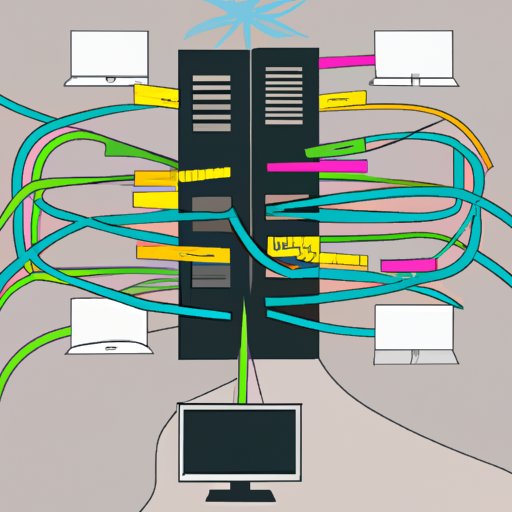Introduction
Computer information systems are an integral part of modern business and society. They are used to manage and store data, automate processes, and enable businesses to make informed decisions. In this article, we will explore the basics of computer information systems, their components, the benefits of implementing a computer information system, and the role they play in business and society.

Exploring the Basics of Computer Information Systems
Before delving into the specifics, it is important to understand the basics of computer information systems. A computer information system (CIS) is a combination of hardware, software, networks, and other technology-based solutions that are used to collect, store, process, and analyze data. The purpose of a CIS is to provide users with the tools they need to efficiently manage data, automate processes, and make informed decisions.
There are several different types of computer information systems. These can range from simple applications such as spreadsheets and word processing programs to more complex systems such as enterprise resource planning (ERP) and customer relationship management (CRM) systems. Each type of CIS has its own unique features and functions that are designed to meet specific needs.
The benefits of using a computer information system are numerous. By automating processes and managing data more efficiently, businesses can save time and money, improve productivity, and gain a competitive edge. Additionally, CIS can help businesses make better decisions by providing insights into customer behavior, trends, and patterns.
Understanding the Components of a Computer Information System
A computer information system consists of three main components: hardware, software, and networks. Each component plays an important role in the overall functioning of the system.
Hardware refers to the physical components of a computer system, such as computers, servers, storage devices, and other peripherals. It also includes the operating system, which is the software that runs the system. The hardware is responsible for processing data, storing information, and providing access to users.
Software refers to the programs and applications that are used to run the system. This includes software for creating documents, managing databases, performing calculations, and more. Software is the “brain” of the system and is responsible for controlling the hardware and allowing users to interact with it.
Networks are the connections between computers and other devices. This includes local area networks (LANs), wide area networks (WANs), and the internet. Networks allow computers to communicate with each other and share data, making it possible for users to access information from anywhere in the world.
The Benefits of Implementing a Computer Information System
One of the key benefits of implementing a computer information system is improved efficiency. By automating processes, businesses can streamline operations and reduce manual labor. This leads to faster turnaround times and fewer errors, resulting in increased productivity. Additionally, automation can help businesses save money by reducing overhead costs.
Another benefit of a computer information system is cost savings. By utilizing the latest technologies, businesses can reduce the need for expensive hardware and software licenses. Additionally, they can reduce their reliance on third-party vendors and eliminate the need for manual data entry.
Finally, implementing a computer information system can lead to increased productivity. By automating processes, businesses can free up employees to focus on more strategic tasks. This can lead to improved customer service, higher quality products, and greater profitability.

Analyzing the Role of a Computer Information System in Business
A computer information system plays an important role in modern business. The most obvious benefit is automation, which can be used to streamline processes, reduce manual labor, and increase efficiency. Additionally, a CIS can be used to manage data more effectively, enabling businesses to make better decisions.
Data management is another key benefit of a computer information system. By organizing data into a structured format, businesses can easily access, analyze, and report on information. This helps them identify trends, spot opportunities, and make better decisions.
Finally, a computer information system can provide businesses with valuable insights. By leveraging advanced analytics and artificial intelligence, businesses can gain a deeper understanding of customer behavior, market trends, and other factors that can help them stay ahead of the competition.

Examining the Impact of Computer Information Systems on Society
Computer information systems have had a positive impact on society. One of the most significant benefits is improved quality of life. By automating mundane tasks and providing easier access to information, people can spend less time on tedious activities and more time doing things they enjoy.
In addition, computer information systems have increased access to information. With the internet, people can quickly find information about any topic they desire. This has made research and learning easier than ever before.
Finally, computer information systems have created new job opportunities. As businesses continue to adopt new technologies, there is an increased demand for professionals who are skilled in using these systems. This has created a wealth of job opportunities for people with the right skills and experience.
Conclusion
Computer information systems are an essential part of modern business and society. They provide businesses with the tools they need to automate processes, manage data more efficiently, and gain insights into customer behavior. Additionally, they have improved quality of life and created new job opportunities for those with the right skills and experience.
In summary, computer information systems are an invaluable tool for businesses and society. By understanding the basics, components, and benefits of implementing a computer information system, businesses can take advantage of the opportunities available to them and stay ahead of the competition.


